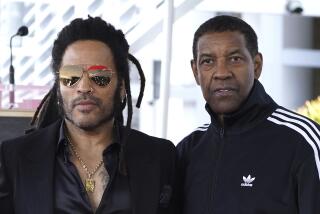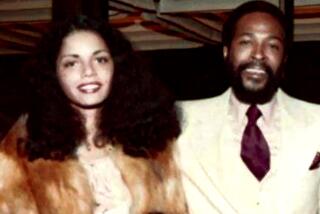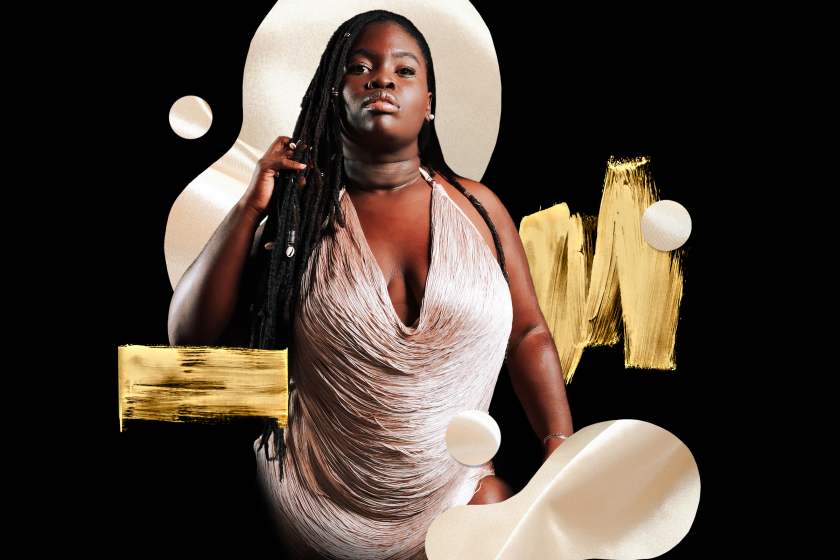Shades of Dylan in an Era of Flash : Peter Case examines how it feels to be on your own, with no direction home
If the pop industry was still obsessed with finding the next Bob Dylan instead of settling for the next Poison, you might find Peter Case’s new album being greeted with the excitement that once surrounded “Another Side of Bob Dylan” or maybe even “Bringing It All Back Home.”
Instead, the album--the Los Angeles singer-songwriter’s second solo collection--starts out as a decided long shot in a pop world where thoughtfulness and craft are often bypassed in favor of trendiness and flash.
Even the album’s title is a wry commentary on the way pop merchants keep coming up with terms to describe what’s in style and what’s not: “The Man With the Blue PostModern Fragmented Neo-Traditionalist Guitar.”
Tracy Chapman’s success last year demonstrated that radio programmers and the public can still respond to graceful and intelligent songs, but will lightning strike twice--and so soon?
As did John Prine, Bruce Springsteen and the countless other artists inspired by the eloquence and imagination of Dylan, Case has his own agenda. There’s social consciousness in some of his folk-accented tunes, but his chief theme is exploring relationships and values; a search that begins within an inventory of personal desires and doubts.
Throughout “Blue Guitar,” Case leads us on an extraordinary journey, one set against the frequently distressing realities of urban life. “Put Down the Gun,” “Travellin’ Light” and “This Town’s a Riot” are statements of despair and hope from a man who appears to know how it feels to be out on your own, with no direction home.
The characters in the songs are mostly troubled; people struggling to find a way to believe in themselves--or in something. Despite its vigorous beat, “Travellin’ Light”--co-written by Bob Neuwirth--is as dark and desperate a tale of youthful alienation as anything from the punk brigade:
Well, I don’t know where I got it
But I got it just the same
It’s a feeling that can rip you apart
Follows me around like a part of my name.
Like I was born with a time bomb
Instead of a heart.
“Put Down the Gun” is an equally stark look at the way self-destructiveness can sometimes seem as the only positive act or escape when you’re trapped in a seemingly hopeless situation.
Well you grew up on a street
Where the cops don’t go alone
In a town , just like a wishing well ,
You were cast in like a stone.
Now, your friends throw their lives away
Just making the rounds
Yeah, they can’t tell the difference
Between the shepherds and the clowns.
Elsewhere in “Blue Guitar,” Case sings of discarded people (“Poor Old Tom”) and forgotten places (“Old Part of Town”), of lost souls (“Entella Hotel”) and faded love (“Two Angels).
Yet the album is not without hope. There is a spiritually accented idealism in such numbers as “Rise and Shine” and, especially, the closing “Hidden Love” that offers comfort and reassurance.
In the press release accompanying the album, Case speaks about what he sees as a confusing era when defeats are sometimes terminal and victories can be fleeting. “This may be the hardest time to know yourself in the history of the world,” he notes. “Everything’s too big, too crowded, too greedy, too crazy, too fake, too much. And it’s never enough at the same time. Fantasy, escape, distraction, destruction--it’s all gotten too easy to avoid what’s right in front of our faces.”
Much like Lou Reed’s “New York,” Case’s “Blue Guitar” is about questions of values and will; the way we can walk by the homeless or disadvantaged and rationalize that their problems are so insurmountable that there’s no reason to even feel guilty for not lending a hand. Indeed, Case jokes, he could have called his album, “The Man With the Blue Post-Reagan, Homeless, Disenfranchised Guitar.”
But that title would have missed the point. “Blue Guitar” doesn’t center on the body politic the way “New York” does. This is the story of a very personal journey, and it is, to a remarkable extent, a story of Case’s own journey. The album is the story of both a songwriter finding his artistic voice and a person looking for purpose in life. Rarely in pop have the two goals coincided more dramatically.
That’s one reason, perhaps, this album has a freshness and innocence, energy and maturity that makes it hard for an outsider to judge whether it was written by someone in his 20s or his 40s.
Case’s journey began in Hamburg, a small town just south of Buffalo, N.Y. Weaned on his older sister’s Elvis Presley and Chuck Berry singles, he eventually discovered Bob Dylan and the Beatles and began toying with songwriting. Music, in fact, seemed his only source of strength. He had a hard time adjusting at school and dropped out after the ninth grade.
“I was really kind of goofed up,” Case said recently, sitting in a modest Hollywood area restaurant, puffing on a cigarette. “It was a mixed-up period and I felt I had to get out of this whole life style . . . it was drugs, kinda nihilistic and violent. I was just a kid, you know?”
Case, now 35, was worried about where his life style in Buffalo would lead, so he picked up a guitar and bought a bus ticket to go as “far away from Buffalo as you could without a passport.” He ended up in San Francisco in the early ‘70s and lived on the streets; music, again, was his main ally.
“It was a really exciting time,” Case said. “We were into a lot of blues things . . . Rev. Gary Davis songs, Lightnin’ Hopkins, Mississippi John Hurt. It was a learning period, you know. I just loved it. I got in with a bunch of people and we didn’t talk about how you are going to make it or where you are going to get a record contract. We just played on street corners or wherever we could.”
Still filled with a sense of wanderlust, Case sometimes took off on trips that led to his singing for spare change on street corners from Mexico to Portland.
“Life always seemed like something that was just somewhere a bit farther down the road,” he said of that time. “That was part of my problem. I’d go out on the road, hitch-hike and see how far you could get on $20 bucks. I wasn’t really very focused.”
By the end of the ‘70s, Case joined a rock band, the Nerves, which attracted some attention in alternative rock circles. When the group broke up, Case moved to Los Angeles and formed the Plimsouls, a hard-driving rock band that became a favorite in the early ‘80s on the local club scene.
Case was especially compelling on stage with the Plimsouls, exhibiting a strong trace of Lennon-ish intensity in his voice. Some of his songs too had a melodic, Beatlesque flair. But Case’s songwriting was uneven--due in part, he believes now, to the lack of focus.
“It was a strange time,” he said, “The audiences would be out there, all excited and seeming to enjoying what we were doing. But it seemed (at times) like a ritual . . . they were being an audience and we were being a band, but I didn’t feel we were communicating, you know?
“The more I thought about it the more I realized that I felt lost. I wasn’t happy. I was starting to write different songs and I didn’t know if the audiences coming to the shows were ready to listen to them. The questions I wanted to write about were the basics: Who am I . . . who are you . . . and what are we doing here?
“If you listen to songs like ‘A Million Miles Away’ and ‘Oldest Story in the World,’ you can see my thinking at the time and how I was starting to move in a new direction. Besides, my personal life wasn’t exactly the most stable. I was angry, resentful . . . drinking too much. I felt like I was on the verge of an explosion. For a lot of reasons, it seemed like a time to take a break.”
Case returned to basics as a performer, working with an acoustic guitar and playing small clubs, such as McCabe’s and the Anticlub. His mid-’80s search for his artistic voice was accompanied by a spiritual awakening. Case became a Christian and his songs began to reflect a more gentle, philosophical tone. The first solo album, titled simply “Peter Case,” won considerable critical support in 1986, but it didn’t reach out with the clarity and punch of the new “Blue Guitar.”
“I really wanted to deliver this time,” Case said. “In some ways, the first album was made in a sort of isolation. It was me exploring my own thoughts, trying to figure out what I wanted to say.”
Rather than form a new band, Case continued to give solo performances after the first album was released. “Touring on my own helped me become more conscious of reaching out to people,” he said. “I felt the importance of making sure someone understood just what you were trying to say, the importance of not just (trying to reach them) with the over-all sound of the music.”
Now that he is comfortable with the music, he has formed a trio, which will appear Wednesday night at Bogart’s in Long Beach and June 8 and 9 at Club Lingerie before going on tour in support of the new album.
Despite the dark moments in “Blue Guitar,” Case sees it as optimistic record. “A lot of people have said: ‘What a bleak record, but I think it’s my happiest record. But, then, I guess I wanted both feelings in the record because life is very difficult, yet there is also hope.
“I believe we are in God’s hands and I’ve seen things work out in my life and in other people’s lives. I believe that life is holy and that it is important.”
Neither the album nor Case’s comments during the interview, however, suggest a life without problems. He is separated from his wife, songwriter Victoria Williams, and he speaks warily about his old self-destructiveness (“My disease is simply in remission”).
“I don’t know,” he says, shaking his head. “You know, the Bible tells me the good guys are going to win. . . . It just doesn’t say when.”
More to Read
The biggest entertainment stories
Get our big stories about Hollywood, film, television, music, arts, culture and more right in your inbox as soon as they publish.
You may occasionally receive promotional content from the Los Angeles Times.






